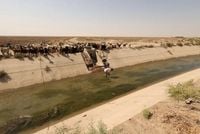In a region long defined by its rivers, Iraq and Turkey are poised to ink a landmark agreement to manage and share the dwindling waters of the Tigris and Euphrates, as both nations grapple with the worst drought in decades. The breakthrough comes after two years of painstaking negotiations, reflecting not just environmental urgency but also shifting regional dynamics and a shared recognition that water scarcity threatens millions of lives and livelihoods.
On October 10, 2025, Iraqi Foreign Minister Fuad Hussein announced that a draft framework agreement on water management between Iraq and Turkey is ready and expected to be signed soon in Baghdad. According to Reuters and statements from Iraq’s Foreign Affairs Ministry, the deal aims to address Iraq’s most severe water crisis in 80 years, a calamity that has left reservoirs at their lowest levels since the 1940s. The causes, officials say, are multifaceted: a parched rainy season, climate change, and—perhaps most contentiously—upstream dam projects in Turkey and Iran that have dramatically reduced river flows into Iraq.
"The first is a long-term objective, represented by reaching understandings and a draft framework agreement on water management and the role of the Turkish government and companies in this field," Hussein said during a joint press conference with Turkish Foreign Minister Hakan Fidan. He added that Fidan had been formally invited to Baghdad to finalize the agreement, signaling a new chapter in regional water diplomacy.
The Tigris and Euphrates rivers, both of which originate in Turkey, provide the lion’s share of Iraq’s fresh water. For years, Iraqi officials have complained that Turkey’s extensive dam-building program has throttled the flow downstream—an accusation that has fueled diplomatic tensions and even prompted threats of severed ties. Earlier this month, Iraq’s influential Badr parliamentary bloc went so far as to threaten political and economic retaliation, calling Turkey’s restrictions a "clear hostile act." According to The Times of India, the issue has reached a crisis point, with Iraq’s Ministry of Water Resources warning that the country has entered a "critical" stage as water levels in the Tigris and Euphrates continue to fall.
But the new agreement, if finalized, could mark a turning point. Turkish Foreign Minister Hakan Fidan confirmed that a joint committee has been working for two years to tackle the crisis. “Turkey recognizes the severity of water scarcity in Iraq, especially in Basra, Mosul, and other cities,” Fidan said. "It is a shared issue resulting from climate change and drought conditions." He emphasized that the water of the Euphrates and Tigris rivers "belongs to all of us," and expressed hope that water rehabilitation projects would be implemented swiftly. “This water shortage will continue to be a problem not only today but also for years to come,” he warned, as reported by AP.
The draft framework agreement is ambitious in scope. According to AFP and other sources, it sets out how the two governments will jointly manage water resources, defining roles for Turkish companies and state bodies. The agreement also includes immediate measures to address Iraq’s acute needs, such as increasing near-term water releases to the south, where the crisis is most severe. Fidan explained that the draft builds on a joint mechanism agreed two years ago, with the first pillar focused on rehabilitating Iraq’s water distribution and infrastructure, and the second creating a standing consultation group to coordinate water-sharing decisions.
Turkish institutions—including the State Hydraulic Works and the Agriculture and Forestry Ministry—are already working closely with Iraq’s Water Resources Ministry. Both sides agree that the solution is not as simple as opening the floodgates: lower rainfall, shrinking snowpacks, hotter summers, and upstream storage have tightened supplies for everyone. Long-term fixes, Fidan noted, will require not just coordination on river flows but also major upgrades to Iraq’s aging water networks. Turkey, for its part, has urged Iraq to address leakage, unlined canals, and illegal tapping that drain deliveries before they reach farms.
The Tigris and Euphrates rise in the mountains of eastern Turkey, snake through Syria and Iraq, and finally merge to form the Shatt al-Arab before emptying into the Persian Gulf. Iraq relies on these rivers for drinking water, agriculture, and power generation. But as reserves have dwindled, disputes have sharpened. The two countries do not have a comprehensive, binding treaty that fixes annual volumes on both rivers. Previous agreements, like a 1987 protocol in which Turkey pledged a minimum flow on the Euphrates into Syria, and a 1990 Syria-Iraq deal splitting that flow, have proven inadequate in the face of mounting climate pressures and new infrastructure projects.
Recent years have seen a push for deeper cooperation between Baghdad and Ankara. Alongside water talks, the two countries have worked together on the planned Development Road corridor, linking Iraq’s port of Basra to Turkey and on to Europe. Last month, Iraq resumed oil exports from its semiautonomous Kurdish region through Turkey’s Ceyhan port after a two-year hiatus. Political relations have also improved: on Thursday, Turkey lifted its flight ban on Sulaymaniyah International Airport in Iraq’s Kurdish region, a restriction originally imposed over concerns about the Kurdistan Workers’ Party (PKK). The PKK, considered a terrorist group by Turkey, the United States, and the European Union, has long operated in the borderlands, straining bilateral ties. But a recent peace initiative, including a symbolic disarmament ceremony in July, has brought cautious optimism for regional stability.
All these developments form the backdrop to the water agreement, which many see as both a lifeline and a test of regional cooperation. Experts warn that climate change is likely to make such deals ever more urgent and complex. Lower snowpack in the mountains, hotter summers, and erratic rainfall have already tightened supplies, with southern Iraqi provinces hit hardest. According to BBC, Iraq’s Ministry of Water Resources has declared the current situation as “critical,” with reserves at their lowest in 80 years.
Yet, for all the hope the agreement inspires, challenges remain. In July 2025, Iraqi Water Resources Minister Aoun Dhiab accused Turkey of failing to release the agreed volumes of water, contradicting earlier claims that Turkish President Recep Tayyip Erdoğan had promised increased flows. Trust, it seems, is as scarce as water itself. Both sides acknowledge that the agreement is only a first step—implementation, monitoring, and ongoing dialogue will be crucial. Fidan, for his part, struck a conciliatory tone: “We know and understand the difficulties you are experiencing. We are brothers and sisters in this region.”
As Iraq and Turkey prepare to sign the deal in Baghdad, the stakes could hardly be higher. Millions depend on the Tigris and Euphrates for survival, and the rivers’ future will be shaped not just by the climate, but by the willingness of neighbors to share, compromise, and adapt. The coming weeks will show whether this historic agreement can turn the tide for a region on the brink.


